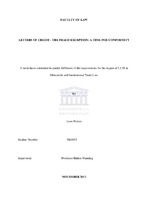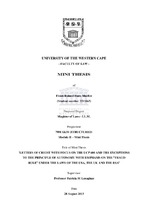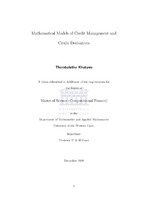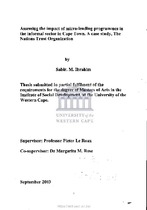| dc.contributor.advisor | Wandrag, Riekie | |
| dc.contributor.author | Fieties, Leon | |
| dc.date.accessioned | 2014-07-24T10:15:41Z | |
| dc.date.available | 2014-07-24T10:15:41Z | |
| dc.date.issued | 2013 | |
| dc.identifier.uri | http://hdl.handle.net/11394/3505 | |
| dc.description | Magister Legum - LLM | en_US |
| dc.description.abstract | The classic justification for Letters of Credit is that it provides an effective assurance of payment from a financially responsible third party. Cross-border transactions magnify the concern of non-payment from a buyer because litigation is not only costly, but it also normally occurs in a foreign and unfamiliar forum. Not only do Letters of Credit provide assurance to the seller that it will be paid, even if the buyer would not pay voluntarily but it also compensate for the weakness of relational ties between the buyer and the seller, should no such ties exist at the time the contract is established. | |
| dc.language.iso | en | en_US |
| dc.subject | Chinese letters of credit law | en_US |
| dc.subject | Independent principle | en_US |
| dc.subject | International payment systems | en_US |
| dc.subject | Letters of credit | en_US |
| dc.subject | South African letters of credit law | en_US |
| dc.subject | Strict compliance principle | en_US |
| dc.subject | The fraud exception | en_US |
| dc.subject | Uniform customs and practice (UCP) | en_US |
| dc.subject | United Kingdom letters of credit law | en_US |
| dc.subject | United States of America letters of credit law | en_US |
| dc.title | Letters of credit - the fraud exception: a time for conformity | en_US |
| dc.rights.holder | uwc | en_US |




